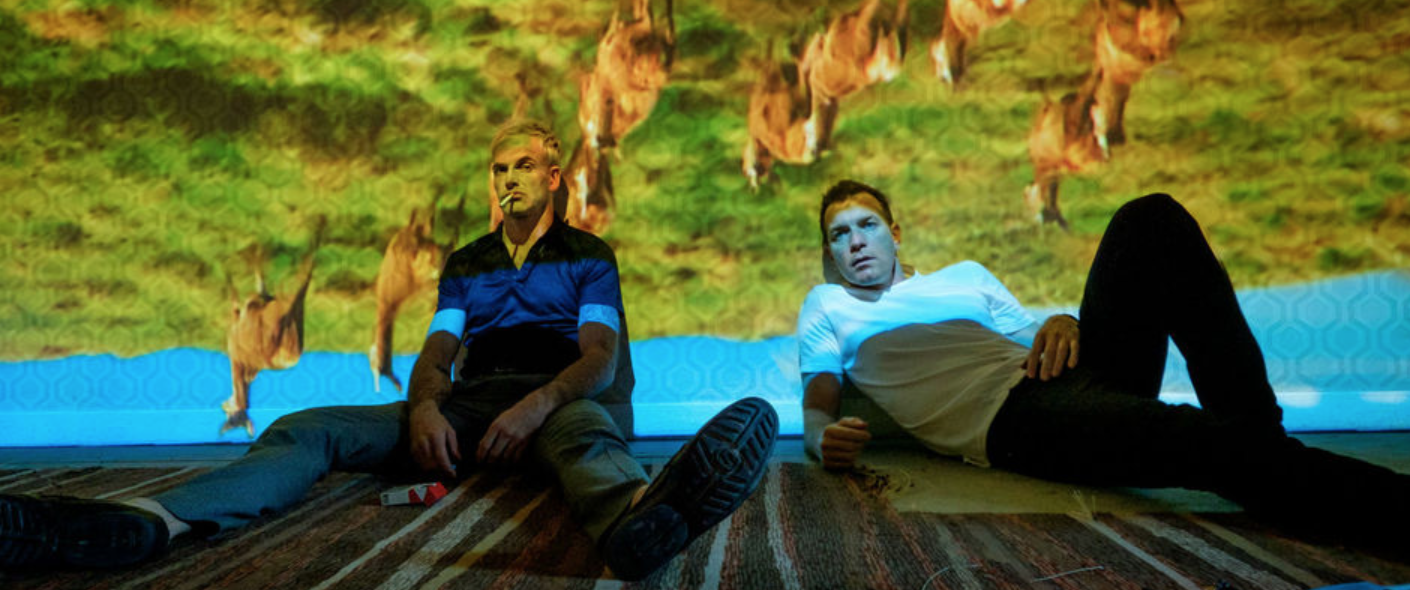Cynics of the sequel as a concept might tend to feel divided regarding T2 Trainspotting, Danny Boyle’s affectionate follow-up to the beloved original, released in 1996. Joining forces once again with screenwriter John Hodge (who teamed with Ewan McGregor immediately after Trainspotting with 1997’s A Life Less Ordinary), Boyle brings the often hopeless characters of Irvine Welsh’s back to life for a narrative centered on Mark Renton’s (Ewan McGregor) atonement. For those who have forgotten, the last he saw of his three best friends and fellow junkies, Simon “Sick Boy” Williamson, Daniel “Spud” Murphy (Ewen Bremner) and Francis “Franco” Begbie (Robert Carlyle), he was ripping them all off of the £4,000 they were each to receive from selling heroin to a dealer in London.
With Hodge and Boyle parsing out elements of Welsh’s own book sequel to Trainspotting, Porno, the stage is set twenty years–as opposed to the ten in the novel–after the betrayal. Mark has come back, seemingly like a ghost, from Amsterdam, where he retreated with his bounty to start anew and kick the old heroin “habit.” This is how we find ourselves watching him run on a treadmill at a gym during the intro scene, a sharp and incongruous contrast to the “Rent Boy” we knew from 1996, all Damon Albarn emaciated hotness and physical toning aloofness. But, clearly, some of the old drug effects must have remained, as he collapses in the midst of his hamster wheel run.
Meanwhile, Spud explains to his support group that his entire attempt at cleaning up was ruined by daylight savings time, a British phenomenon he’d never been affected by as a junkie, but suddenly tripped him up on every engagement he had one day that ended up losing him his job and his visitation rights to his son, Fergus (Charlie Hardie), and botching the last of good faith his ex, Gail (Shirley Henderson), had in him. Elsewhere, Simon has dropped the “Sick Boy” epithet, developed a cocaine dependency and gone in league with a Bulgarian sexpot named Veronika (Anjela Nedyalkova). Their moneymaking scheme is dependent upon Simon putting a hidden camera in the room where Veronika has sex with semi-prominent men (not much prominence to be had in Edinburgh, aye?) while using a strap-on for added later embarrassment. The blackmail business doesn’t prove to be all the satisfying or dignifying, though, especially for Veronika, obviously weary of the lifestyle she’s found herself in.
And so returns Mark to this tableau, mildly expecting that Simon will feel the return of the £4,000 will at least settle the score. But no, Simon has other ideas for Mark—wanting nothing more than to claim his revenge. Veronika is honest in informing Mark of this, already instantly attracted to her, as Simon goes to the bathroom to do a bump. It is during this time that Mark, feigning to have a wife, two kids and a job to return to in Amsterdam, leaves the desolate pub to catch his flight. He never does get on it though, tied to Edinburgh in a way that is best explained by Veronika when she speaks to Mark of her own desire to return home to Bulgaria. “What’s there for you?” he asks. She returns, “Emotional attachment, that’s all.”
And this is the general treatise of the film: that no matter how far or for how long you stray away from home—run from it for however many decades—coming back is an inevitability. And so is very little truly changing in your absence. As Simon says to Mark when they return to Tamworth field to honor the memory of their fallen friend, Tommy MacKenzie (Kevin McKidd), who didn’t make it out of his heroin addiction without contracting AIDS, “You’re a tourist of your own youth.” He shuts his mouth, however, when Mark reminds him of the baby, Dawn, he lost as a result of not paying attention to her while on heroin among a group that included Mark and their friend, Allison (Susan Vidler), the mother of Dawn.
It is in this and so many other ways that Boyle and Hodge drive home the point that it is only those who have known you the longest that can both provide the greatest source of comfort while still knowing just how to pick at all the emotional scabs you thought you’d managed to heal.
This is, in part, why Simon doesn’t inform Mark that Begbie has broken out of prison. The hot-tempered, murderously raging Scotsman is all too ready to have his go at Mark when Simon tries to throw him off the scent of his location by telling him he’s been in Amsterdam. Simon’s protection of his oldest friend emphasizes just how much of an undercover bromance T2 is. In fact, Veronika even mocks them in her native tongue as they reminisce about George Best being the greatest footballer of all time, suggesting that they should just “fuck each other.” But with intense love comes intense hate, and Simon and Mark can’t help but fall back on their old, underhanded ways with regard to a bit of backstabbing. At a pub called, naturally, The Boy Who Cried Wolf, is where the buildup to the duo’s final revelations about one another begin.
And yet, the only thing stauncher than the Catholic-hating Protestants at a remote West Scotland pub perpetually celebrating the year 1690 when the Battle of the Boyne led to a Protestant victory over James II (you’ll understand when you see the movie) is an old friendship like Simon and Mark’s. It can even withstand the revamping of the famed “Choose life” speech so oft quoted from the original film.
As Boyle said of Welsh’s own sequel to Trainspotting, “[It’s] not a great book in the way that Trainspotting, the original novel, is genuinely a masterpiece.” Well, the same can be said of T2. Nonetheless, it’s an endearing portrait of redemption and acceptance, offering the notion that sometimes, there can be solace rather than pain in the past.





















